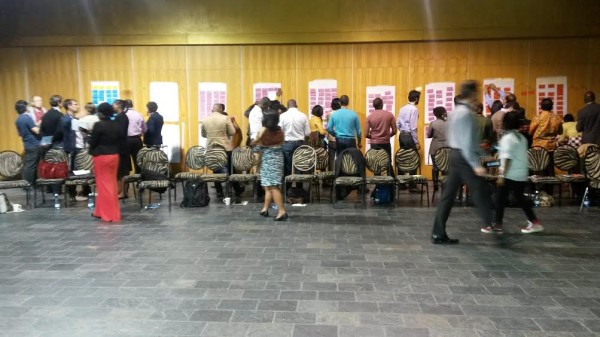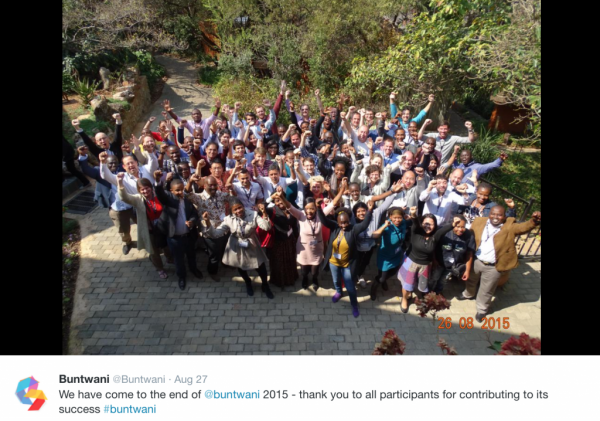'What are the next steps in innovation for good governance?' This was the theme for this year’s second annual Buntwani conference, which brought together global thought leaders from civil society, government, academia and technology to ask: what in innovation for governance is actually working, what isn’t, and why?
At the opening of the event, organisers David Barnard (TechSoup) and Jay Bhalla (Open Institute) reflected that tech4development is not a fledgling concept anymore and that, as a sector, we need to be more coordinated, more knowledgeable and more accountable for results.
In 2012 Rakesh Rajani noted that for the past few years we’ve been pointing to the same examples of success, U-Report, Ushahidi, Check my School. Today, it’s 2015 and there still isn’t much to point at in terms of apps and tech-based innovations that have made a real impact.
The objective of the two-day Buntwani meeting was to openly explore the hard questions about how technology can realistically support governance efforts.
Are we funding the right projects? Are we too tech-optimistic? Are we missing key actors in the conversation? Are we achieving more than lip-service when it comes to concepts such as transparency, accountability, openness and collaboration – especially given competition for funding? Are we learning, and if not, why?
So, what did I learn?
Government involvement is key to governance projects
This might sound obvious, but there are many projects that come from technology-focussed initiatives or isolated parts of civil society. They then have to work desperately to gain the involvement of government – who are not keen because they were not involved from the beginning.
People forget you’re not working with government, you’re working with human beings and human beings like to be respected, validated, encouraged and assisted.
–Al Kags, Open Institute
Innovation isn’t about the newest technology, or technology at all
Technology is certainly helping processes become more efficient and transparent, but it does not – on its own – result in accountability, or change.
The Bahawalpur Service Delivery Unit (BSDU) led by Imran Baloch, the District Coordinating Officer forBahawalpur district in Punjab has digitized the reporting mechanism for local health workers, who help him manage essential services for the 3.6 million people in his district.
The success of the BSDU project is not determined by whether gaps in service delivery are noted by Imran’s team, but whether they can use this information to prompt a response from government officials working on health services. Even though Imran himself works for the government and has an appetite for change, it does not come easily.
Ali Inam, project leader from the Technology for People Initiative, a partner on the project, notes that change relies on relationship building far more than technology.
You have no idea how many cups of tea I’ve had to drink, listening to how a minister’s daughter hasn’t yet got married, just to gain their trust. You have to be present long enough, and really spend time with people, before they’ll implement a new tool.
Our intervention isn’t a part of their job description, so if they refuse to use it, they won’t get fired, and some of these people have been working in this position for over twenty years. We have to motivate them, and inspire them, so they’ll get on board with what we’re doing.
We’re not learning or collaborating
At one point during the event I ceased to enquire what it was people were working on.
I work for an organisation that promotes transparency, accountability and openness, and supports locally-led, bottom-up solutions.
It seems, we all do.
So why haven’t we heard of each other? Why does it take TechSoup, Open Institute and Making All Voices Count investing time and money in an event to bring us all together to talk? Even though we pride ourselves on using technology to open up data and share information, is there actually a fundamental communications gap in our sector?
Interestingly, Tom Walker and Indra de Lanerolle discussed The Engine Room’s research, which supported a general consensus that there is a serious communications gap when it comes to organisations choosing which technology to support their interventions.
It’s isolated decision-making, without heading to a (potentially non-existent?) forum to get advice from those who might have ‘been there, done that.’
We’ve found that people forget to spend time researching; they’re too keen to dive in. So few organisations went and got unpaid (and therefore unbiased) advice on which tool to use. And we discovered there may be bias from techies who want to build something new, rather a tool that already exists.
None of these lessons are new, so why are we here?
At the closing of the event, some expressed frustration.
What’s the use in being here, we’ve already made these observations, why do we keep going around and in circles?
–Ken Banks, Founder of FrontlineSMS
You have a lot of different funders and they each have their strategies and Theories of Change and you find that they’re often coming from quite different perspectives and have very different kinds of assumptions embedded in their approaches… and some of it may be based on stuff that we should probably know better and should have moved on from.
–Brendan Halloran, Transparency and Accountability Initiative.
The issue is that a lot of ICT4D projects are measured on their outreach, and not their responsiveness, if you look at many “successful” ICT-enabled citizen engagement platforms – they may have had huge amounts of uptake, but there’s not indication at all of any response from government.
–Duncan Edwards, Institute of Development Studies.
So, how do we take it from here – and make sure I’m not writing the same blog this time next year?
At Buntwani, more than 80 individuals with a genuinely even distribution of actors from all sectors and regions came together to discuss sometimes frustrating realities, share experiences, and collaborate to figure out what can we do differently in the future.
I want to include this photo as a tribute to Ferdinand Katendeko from the African Peer Review Mechanism (APRM), who moments earlier exclaimed: “Where else would I be seated next to all of you?

Knowledge-sharing in action featuring Al Kags Open Institute, Tatenda Mazurua Election Resource Centre, Ferdinand Katendeko APRM, Nicholas Etyandg CAFOD, Lucy von Sturmer Making All Voices Count.
In the spirit of collaboration, all participants co-created a wish-list that a year from now, we don’t want to have to repeat. This is what we’re arguing should be the minimum in next steps.
We have to be realistic, start small and start with ourselves.
Within your organisation, how often do you reflect, share experiences, knowledge and ask for feedback?
What struck me during this event was how almost everyone admitted that within their own organisations, collaboration was not occurring.
People felt too rushed to learn; to read things, to follow ict4d “news” and if they made time, many expressed not knowing where to turn. Just as government is made up of people, changing all the time, so are we. Let’s be realistic about institutional knowledge.
And if we’re really open to learning, are we open to bad news? Are we prepared to change our course, stop what we’re doing, and admit that we were wrong?
Let’s start with inclusion in conversation and speaking to all audiences, not just our own.
This was not a passive event, and a hat-tip to Allen Gunner whose facilitation style truly opened up a space for new voices and conversations to occur.
Allen used some great guiding words to set the tone for conversations at Buntwani, and it would be amazing if these were taken forward by everyone working on these issues.
If we can’t talk honestly, simply, and directly to and with one another, what will we be able to achieve?
- Listen – even though we all use the same words, we are likely to have very different meanings. Please work to understand people’s definitions.
- Speak simply – respect that we are working with people from very different contexts, many of whom speak English as a second language. Let us refrain from passive-aggressive terminology and focus on inclusion and accessibility.
- Ask – don’t presume to know everything, and to be intimidated to ask. Questions are a heroic act of leadership.
And finally…
These points don’t just apply to those of us implementing, researching or working in the governance field – they also apply to funders.
Before the next Buntwani, I’d like to see a multi-donor version of Buntwani 2015. We have learned these lessons, but we need support to act upon them.
As Lindelwa Nxele from the Public Service Accountability Monitor expressed during a session on learning and collaboration:
We’re simply not able to do everything ourselves; we have to collaborate!

